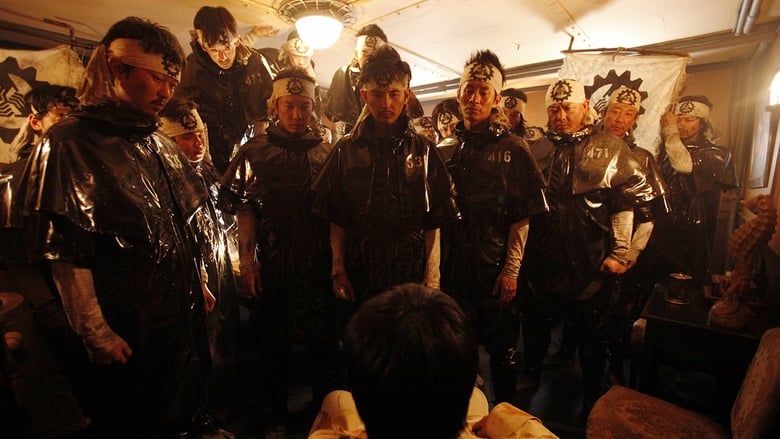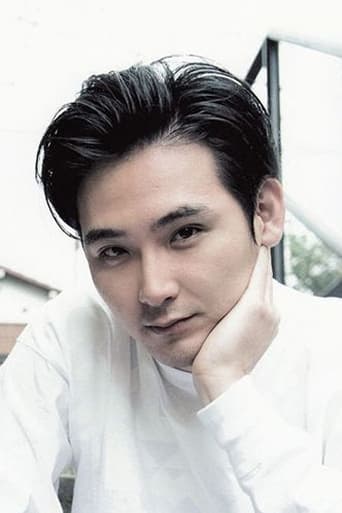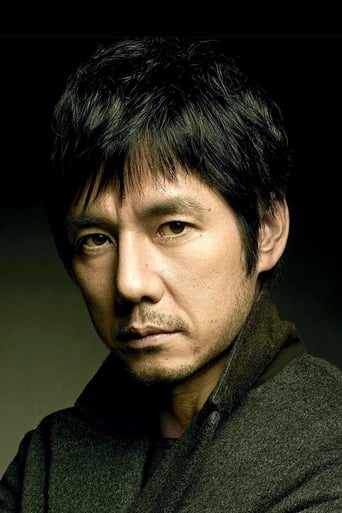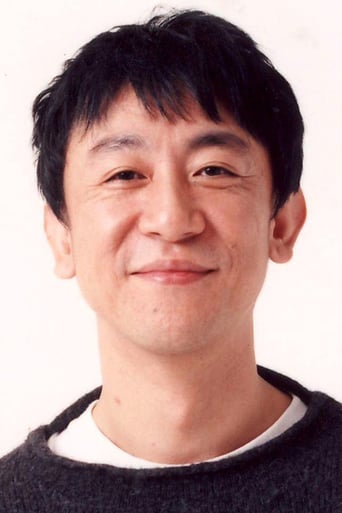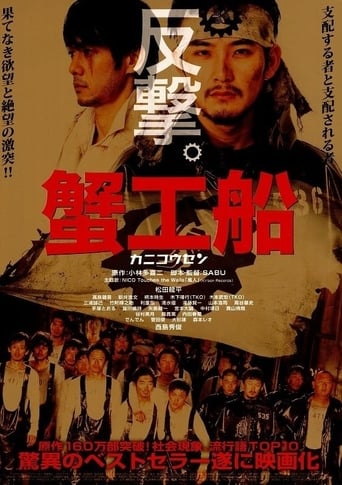
On board at the boat Kanikosen, where fish and crabs preserves, forced workers to work under miserable conditions, with minimum wages. Some can not cope with conditions and even death from malnutrition, and is also the supervisor of the more vicious variety. Shinjo, one of the employees, trying to convince the others that they will get good luck and fortune in his next life, and persuades them because they commit suicide to get there faster. It ends, however, in a single major failure. Rather than flee Shinjo being picked up by a Russian ship. Once there, he is overwhelmed by the social conditions that are completely different from those he has just left and decided therefore to return to Kanikosen to save their employees.
You May Also Like

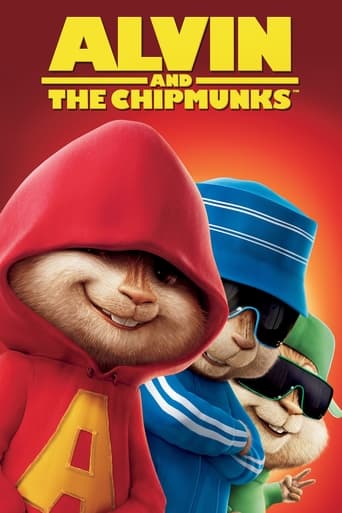

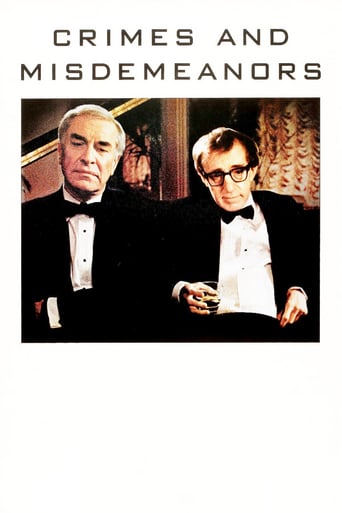

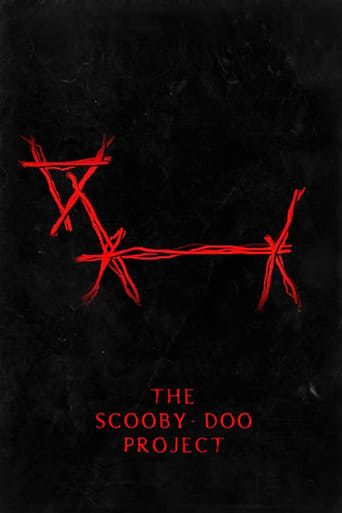
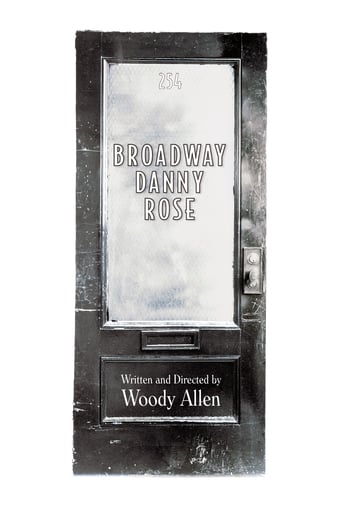



Reviews
This movie is the proof that the world is becoming a sick and dumb place
Save your money for something good and enjoyable
Entertaining from beginning to end, it maintains the spirit of the franchise while establishing it's own seal with a fun cast
I cannot think of one single thing that I would change about this film. The acting is incomparable, the directing deft, and the writing poignantly brilliant.
Sabu's brilliant screen version of a 1929 proletariat novel concerns the oppressed crew of a crab canning ship. Forced to work in brutal conditions they dream of escape. When one of their number decides to commit suicide the others decide to join him figuring the next life has to better than this one. It goes wrong and the crew is forced to endure more punishment until a combination of Buddhist teaching and a stay on a Russian cargo ship set things in a different direction.This is a brilliant film. It's a very political film. Its an intellectually challenging film. It's a very human film. It's a film that seems to improve the more you think about it.I'm a fan of Sabu. I like that his films take things that we think we know and turn them just enough that we are forced to see things differently. I like that he takes chances, what else do you call a scene that is suppose to be a mass suicide that turns into black comedy as the motion of the ship makes death not an option.(actually suicide, as is any form of escape, is thwarted repeatedly through the film). I like that he assumes that his audience is adult and will be willing to work with him. Things are laid out and while the plot moves along its up to the audience to connect the larger dots and to make the film take on a larger significance.For most of the film we see only the hell of the canning floor. There is no outside would. If there is anything else it's a fleeting view, more often night or fog obscures the view. It's a hell that approximates the hellish world of Fritz Lang's Metropolis. There is talk of heaven and hell and notions of hell being with in us and where do we choose to live. Are we doomed to live in that hell or can we escape? The answer isn't clear, though there is hope. Sabu is asking us to consider our jobs, our lives and our existences, should we wait for the next life or do we seize the day? I really like this film. Its not necessarily a warm and fuzzy movie, but it will make you feel good, especially if you allow the film to do what its going to do. It's a mannered film at time. Its emotional cold at times and yet I was touched. There is a kindness and a life to it.Forgive me the film is hard to describe. As with most Sabu films its easy to tell you the plot, but not always to tell you how they operate or how they make you feel. I know that grates on some people. Films for many people have to be a certain way and if they aren't they can't really process them. I like Asian films because they often take you out of the comfort zone. Sabu's film will take you outside of that comfort zone even more. Its not a David Lynch sort of thing, rather its simply an opening up of ones eyes to seeing things in a completely new way. It strikes some as cold and manipulative, and on some level it is, but at the same time it forces one to consider things in ways we haven't before.In the 24 hours since I've seen the film I've been toying with the idea that this is one of the best films of the year. Yes it's more a film of the head then the heart, but in making me think, by challenging me to do more than just sit there the film has engaged on so many more levels than most films ever have. When it was over I felt moved, not just emotional but on other levels as well.If you want to be challenged and to be more than a passive reactor, see this film, it will change the way you think.
Mark Schilling writing in the Japan Times of July 10, 2009, asks: "Why does a novel about exploited workers on a crab cannery boat, published 80 years ago by a young communist writer, later tortured to death by the police, become a hot movie property now?" Well, he explains, last year a store poster based on a proletarian novel became a sensation in Japan -- maybe because the declining middle class arouses class war feelings? -- and somebody adapted the book into a film. Takiji Kobayashi was the author, killed for his advocacy of communism, and his book, whose title literally means "Crab Factory Ship," was originally published in 1929. More details about the book can be found in an article on "seekjapan.jp" by Matthew Ward, where the poster is also reproduced. It's a comic-book style drawing of the revolting cannery workers. There are manga versions of this book.The original novel, by reports, is a doctrinaire dramatization of a workers' revolt. The ship-cannery is a hellish place. The workers are anonymous, often alcoholic and violent. They have families they want to bring back money to, but the pittance they receive goes to gambling or drink. Their life is a kind of slavery. They work near Russia, and when two escape, they get onto a Russian boat and find the workers, whose foreman treats them as equals, are happy. They decide that the idea of competing like ants to outdo Russia and serve the Japanese Emperor is nonsense and they bring back the communist message to their ship. The theme may sound like simplistic agitprop, but the book's lasting importance is signaled by the fact that it has been translated into English by the great Japanese scholar Donald Keene.But in transforming the story to film Sabu (perhaps inspired partly by the colorful manga versions?) has produced something more tongue-in-cheek than the original, as Mark Schilling explains, making it "into a stagy, ironic postmodern statement that puts air quotes around its characters' righteous anger, while blithely tossing in anachronisms (such as present-day language, T-shirts and a battery-powered bullhorn)." This is true, though the anachronisms are less prominent than Schilling implies, and the ironies don't prevent the characters' plight from being touching--even as the drama ripples with comic moments. When initially the lower-depths workers attempt mass suicide by hanging, thinking they'll be reborn as whatever nice life they've thought of at the moment of death, and they merely fall on the floor choking in a heap, the tone of tragic-comedy is set. Some of the young actors are quite handsome and appealing.Matthew Ward actually worked on a fish-processing ship off the Alaskan coast in his younger days and points out that in his experience, which he attests was hellish, the violence was all among the workers. In Kamikosen, it is done by the brutal foreman on the workers; and the captain of the ship is a wimp who does whatever the foreman wants.The movie has an intricate set that in part evokes Charlie Chaplin's Modern Times with its giant wheels pushed by exhausted sweaty men, and a cave-like network of tubes in which the men sleep: that set may remind viewers of Akira Kurosawa's stark film of Maxim Gorky's The Lower Depths . The fishermen are always in long shiny mackinaws. The scene on board the Russian boat consists of a comical man explaining things in bad Japanese to the escapees, and joyous Cossack dancing in which they happily join.On their return the revolt turns dark and brutal, and the film blends its tragi-comedy with elements of horror. It all goes on a little too long, and Kamikosen is a cultural phenomenon of more significance in its original Japanese context than in the larger world. Nonetheless for its mixed genre, its curious blend of appealing pathos and comedy, and its surprisingly strong leftist message, this film may not make it beyond the festival circuit, but is still a pretty good watch and a fairly unique experience.Sabu (Hiroyuki Tanaka, according to IMDb) has already directed five or six films. The direction is competent, the staging ingenious, and the acting, especially by Ryuhei Matsuda as Shinju, the revolt leader,engaging.An official ('Main Slate') selection of the New York Film Festival 2009.The director So Yamamura filmed a version of 'Kanikosen' in 1953.
Top Streaming Movies











